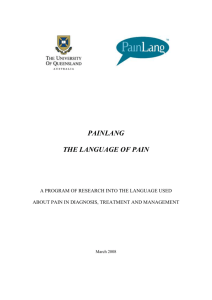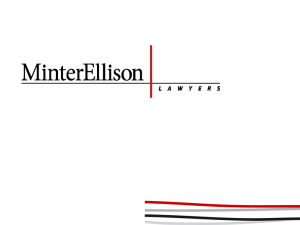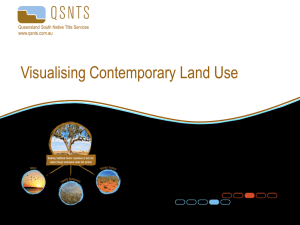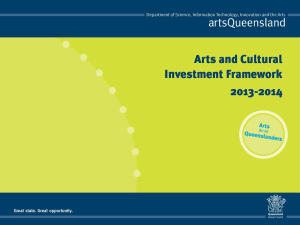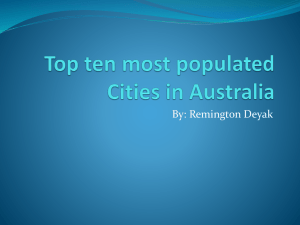Queensland*s Threatened Animals
advertisement
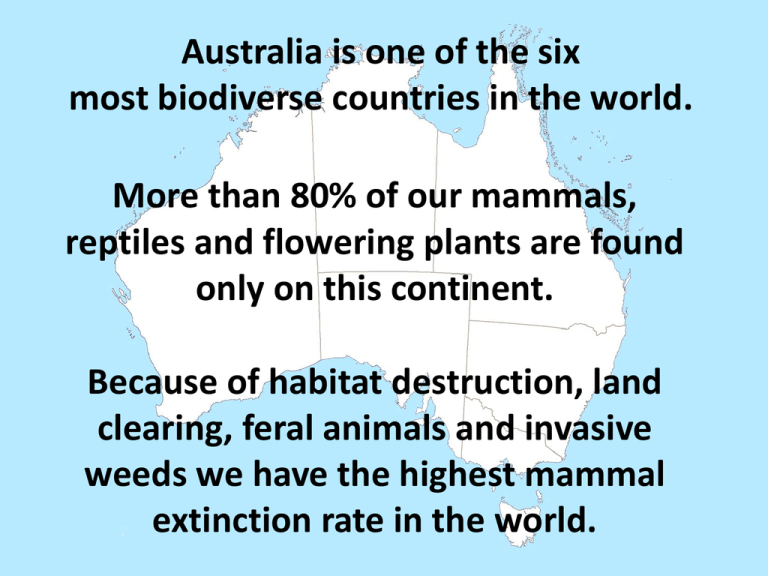
Australia is one of the six most biodiverse countries in the world. More than 80% of our mammals, reptiles and flowering plants are found only on this continent. Because of habitat destruction, land clearing, feral animals and invasive weeds we have the highest mammal extinction rate in the world. Queensland is home to 70% of Australia’s native mammals, 70% of our native birds, over 50% of our native reptiles and over 50% of our native frogs. 12 mammals are now extinct in Queensland. Queensland now has 226 species of mammals. 45 are threatened. 3 are critically endangered. 630 species of birds are found in Queensland. 1 is extinct ‒ The Paradise Parrot. Herald Petrel Ground Parrot 49 birds are threatened. 3 are critically endangered. Yellow Chat (Dawson) There are 485 native reptile species living in Queensland. 36 are threatened. Green Turtle Bulburin Gecko Brigalow Scaly-foot 4 are critically endangered. Hawksbill Turtle Leatherback Turtle Nangur Spiny Skink Retro Slider 127 frog species call Queensland home. 30 are threatened. Cascade Treefrog Fleay’s Barred Frog Wallum Rocketfrog 5 are critically endangered. Armoured Mistfrog Kuranda Treefrog 6 frogs have been declared extinct in Queensland in the last few decades 2 species of Gastric Brooding Frogs. These were unique because they incubated their eggs in their stomachs and gave birth through their mouths. The Mountain Mistfrog is now believed to be extinct. The less charismatic, yet just as ecologically vital threatened animals in Queensland include... 26 invertebrates Boggomoss Snail Lamington Spiny Crayfish McIlwraith Freshwater Crab Apollo Jewell Butterfly Thylacine Darner and 11 bony fishes. Lake Eacham Rainbowfish Honey Blue-eye Murray Cod and the amazing Lungfish This ‘living fossil’ has been around for 200 million years and is the longest surviving vertebrate species on this planet. Will our generation be the last to see it in the wild? Why so many threatened species? #1 REASON? Habitat loss due to land clearing and land fragmentation Queensland has the highest biodiversity in Australia. But the least amount of protected land. 65% of Queensland is leasehold and the current government is looking for buyers. 81% of Queensland is under exploration permits for coal, oil, gas, metals and/or minerals. Only 117,717 km², or 6.80%, of Queensland’s total area, is protected. Queensland, Australia’s 2nd largest state, is 1,730,648 km². Only 115,051 km², or 6.65% is in the National Reserve System. That’s 11.14% of the NRS’s total area. No coal mine has EVER been stopped on environmental grounds in Queensland. There is no land clearing limit for CSG. 1 hectare per well is There are 40,000 wells currently being cleared. planned for Queensland. These figures do not include the land to be cleared for roads and pipelines. The internationally recognised RAMSAR listed wetland, 18 Mile Swamp on North Stradbroke Island is threatened by sand mining. A new alliance has been established to give a strong voice of reason to conservation organisations concerned with the impacts of mining and other potentially harmful activities on areas of high conservation value. Protect the Bush Alliance YOUR LOGO HERE! The primary goal of the Alliance is to advocate the protection of high conservation value areas in Queensland and to identify activities that describe them. PTBA activities include: Identifying where scientific surveys are needed on properties of high conservation value. Lobbying to increase the participation of local NGOs in the Environmental Impact Statement decision making process. Lobbying to increase the number of protected areas. SURVEYS We will find volunteers who will give their time to survey private properties and existing or potential protected areas threatened by mining and other inappropriate use. The purpose of these surveys is to identify new and/or threatened species and vegetation communities. Survey criteria A demonstrated interest by the affected landowner in preserving the conservation values of their property. Existing protected areas, or other public lands, such as State forests that are under threat from mining. The results of these surveys: 1) will build a scientific argument to secure permanent protection of these areas. 2) may trigger Federal involvement in the protection of remnant habitat through the application of the EPBC Act 1992. 3) will provide valuable information to landowners so they can make informed decisions about the management of remnant habitat. Join us now to Protect the Bush for ourselves, future generations and the survival and wellbeing of our state’s precious unparalleled biodiversity. Contact: Paul Donatiu - pdonatiu@npaq.org.au Rae Clark - rae.clark@bigpond.com Sheena Gillman - sheena@naturesound.com.au

